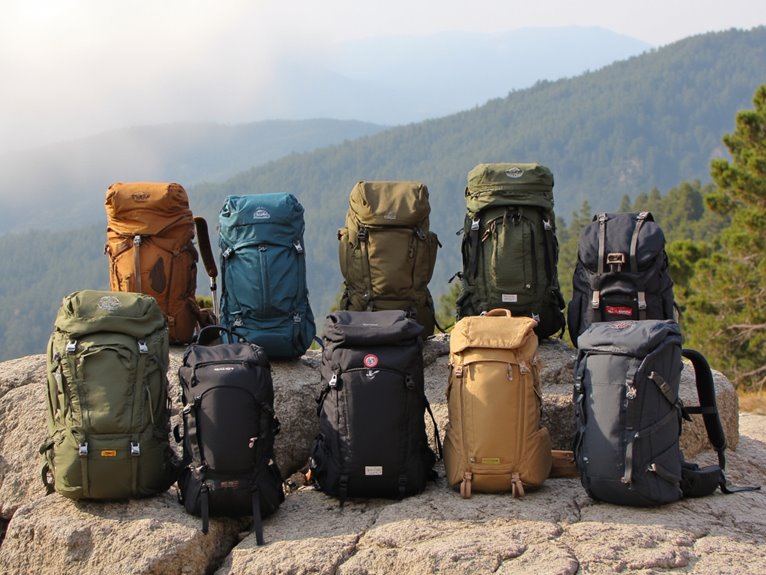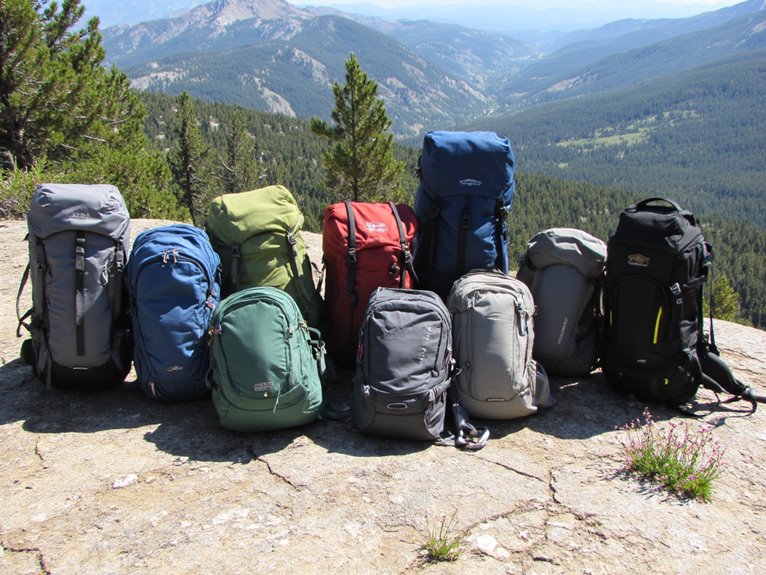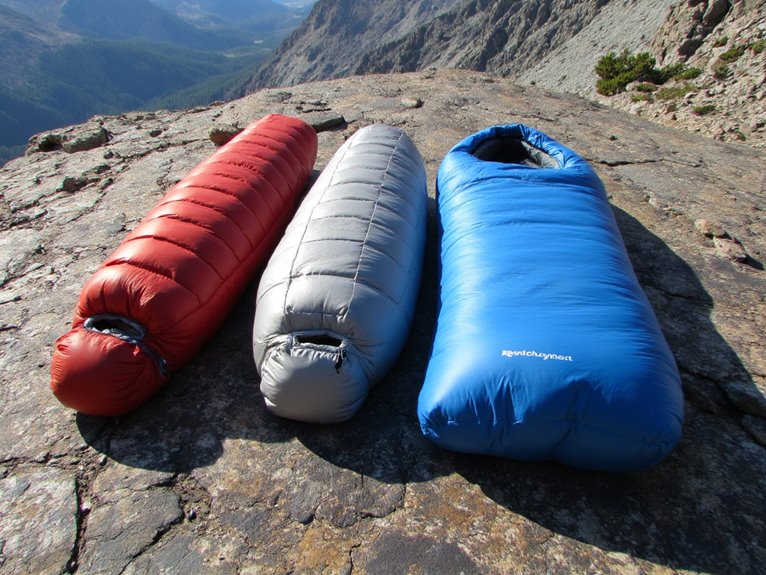What Are Trail Foods?
Trail foods are specially designed to fuel outdoor enthusiasts, adventurers, and athletes, providing sustenance, energy, and nutrition tailored to their active lifestyles. From dried fruits and nuts to energy bars, these compact yet filling options cater to diverse tastes and dietary needs. With a focus on macronutrients, trail foods support peak performance, recovery, and overall well-being. Whether you're a seasoned adventurer or a casual hiker, understanding the evolution, nutritional benefits, and types of trail foods can make all the difference in your outdoor pursuits – and there's more to discover about these convenient snacks that can boost your next adventure.
We are supported by our audience. When you purchase through links on our site, we may earn an affiliate commission, at no extra cost for you. Learn more. Last update on 14th December 2025 / Images from Amazon Product Advertising API.
Origins of Trail Foods
As humans ventured further into the wilderness, the need for sustenance that was both nourishing and portable gave birth to the concept of trail foods. The early explorers and travelers required a reliable source of energy to fuel their journeys, and consequently, trail foods became an essential component of their expeditions. Dried fruits, nuts, and energy-rich bars were some of the earliest forms of trail foods, providing a convenient and satisfying snack for those on-the-go. The innovative spirit of these early adventurers paved the way for the diverse range of trail foods we enjoy today, catering to various tastes, dietary needs, and outdoor pursuits.
Nutritional Benefits Unpacked
Five key macronutrients – carbohydrates, protein, healthy fats, fiber, and water – form the foundation of trail foods, providing the energy, sustenance, and satisfaction that outdoor enthusiasts need to power their adventures. These nutrients work together to support peak performance, recovery, and overall well-being. Trail foods are designed to provide a balance of these macronutrients to fuel your body for the demands of the trail.
Three key benefits of trail foods' nutritional profile:
- Sustained Energy: Complex carbs and healthy fats provide a slow release of energy, reducing the risk of energy crashes.
- Muscle Recovery: Adequate protein and fiber support muscle repair and recovery, reducing muscle soreness and fatigue.
- Hydration: Water-rich ingredients help maintain proper hydration, reducing the risk of dehydration and heat exhaustion.
Lightweight Yet Filling Options
Trail foods that are both lightweight and filling offer the perfect compromise between packing lightly and staying fueled on the trail. When every ounce counts, it's essential to choose snacks that provide sustained energy without weighing you down. Dried fruits, nuts, and seeds are excellent options, providing natural sweetness and satisfying crunch. Jerky, whether beef, turkey, or chicken, is another great choice, offering protein-packed punch in a compact package. And let's not forget energy bars – look for lightweight, high-calorie options that won't spoil easily. By prioritizing these lightweight yet filling options, you'll be able to hike farther, faster, and with more energy to spare. Happy trails!
Backpacker's Pantry Staples
In stocking your backpack pantry, it's essential to prioritize non-perishable items that pack a nutritional punch. A well-curated selection of staples can make all the difference on a long hike, providing a much-needed energy boost at the moment you require it most. In this section, we'll delve into the must-haves, including dried fruits and nuts, protein-rich food options, and whole grain crackers, that will keep you fueled and satisfied on the trail.
Dried Fruits and Nuts
Dried fruits and nuts, the ultimate backpacker's pantry staples, provide a concentrated source of energy, fiber, and flavor to fuel your adventures. These tasty treats are lightweight, compact, and don't require refrigeration, making them perfect for hitting the trails. Plus, they're incredibly versatile – enjoy them as a quick snack, add them to oatmeal or yogurt, or use them to create a trail-blazing trail mix.
Here are three reasons why dried fruits and nuts should be a staple in your backpack:
- Convenient: No prep or cooking required – just grab and go!
- Nutrient-dense: Packed with fiber, protein, and healthy fats to keep you fueled.
- Customizable: Mix and match your favorite fruits and nuts to create the perfect blend.
Stock up on these pantry staples and get ready to hit the trails with energy and enthusiasm!
Protein-Rich Food Options
Five essential protein-rich foods – jerky, peanut butter, eggs, tuna, and cheese – will keep you fueled and satisfied on the go. These backpacker's pantry staples are lightweight, compact, and packed with protein to keep your energy levels soaring. Jerky is a convenient snack that's easy to stash in your backpack, while peanut butter provides a tasty and satisfying spread for crackers or bread. Eggs are a great source of protein and can be easily boiled and packed for a quick snack. Canned tuna is another protein-rich option that's easy to prepare and won't spoil quickly. And let's not forget about cheese – a delicious and satisfying addition to any trail meal. With these protein-rich foods, you'll be ready to take on even the toughest trails.
Whole Grain Crackers
To complement your stash of protein-rich foods, whole grain crackers provide a satisfying crunch and a sturdy base for your favorite trail toppings. These crackers are a backpacker's best friend, offering a convenient and lightweight way to add some carbs to your meals. Plus, they're incredibly versatile – use them to make a peanut butter and jelly sandwich, as a base for avocado toast, or even as a crunchy snack on their own.
Here are just a few reasons why whole grain crackers are a trail food staple:
- Lightweight and compact: Crackers take up minimal space in your backpack and won't weigh you down.
- Long shelf life: Whole grain crackers can withstand the rigors of backpacking, even in harsh weather conditions.
- Endless topping options: From classic combos to creative concoctions, the possibilities are endless!
Energy-Dense Snack Essentials
When venturing into the wilderness, it's vital to fuel up with snacks that pack a punch. Energy-dense options are a hiker's best friend, providing a quick boost to combat fatigue and keep you moving. From calorie-rich trail mix to compact energy bars, we'll delve into the essential snacks to stash in your backpack for a energized adventure.
Calorie-Rich Trail Snacks
Three essential components of a well-stocked trail pantry are calorie-rich snacks that provide a concentrated energy boost to fuel your adventure. These snacks are designed to be compact, lightweight, and overflowing with calories to keep you moving. When selecting calorie-rich snacks, bear in mind that not all options are created equal. Opt for snacks that offer a combination of carbohydrates, protein, and healthy fats to provide sustained energy and satisfaction.
- Nut butters: Rich in healthy fats and protein, nut butters are a satisfying snack that can be paired with crackers, jerky, or eaten straight from the packet.
- Dried fruits and nuts: A mix of dried fruits and nuts provides a natural source of carbohydrates and healthy fats to fuel your adventure.
- Energy bars: Look for bars with wholesome ingredients and a balance of carbohydrates, protein, and healthy fats to provide a quick energy boost.
Compact Energy Boosters
In addition to calorie-rich snacks, compact energy boosters are a vital component of any trail pantry, providing a concentrated dose of energy in a lightweight, easy-to-carry package. These bite-sized powerhouses are designed to provide a quick pick-me-up when you need it most. Think energy bars, nuts, and dried fruits – all compact, energy-dense options that won't weigh you down. Look for options with minimal packaging, like single-serve packets or reusable containers, to minimize waste and maximize convenience. And let's be real, who doesn't love a good excuse to indulge in some chocolate or peanut butter? Compact energy boosters are the perfect excuse to treat yourself on the trail.
DIY Trail Food Creations
Creativity in the kitchen can be a game-changer for outdoor enthusiasts, as a well-crafted DIY trail food creation can transform a humble hike into a gourmet adventure. By making your own trail foods, you can tailor your snacks to your dietary needs, preferences, and the demands of your outdoor pursuits. Here are three benefits of DIY trail food creations:
- Customization: Create snacks that cater to your taste buds and dietary requirements.
- Cost-effective: Make your own trail foods to save money and reduce packaging waste.
- Freshness: Enjoy the satisfaction of munching on freshly made goodies, free from preservatives and additives.
With a little experimentation and creativity, you can whip up delicious, nutritious, and convenient trail foods that will fuel your outdoor adventures. So, get cooking and take your trail snacks to the next level!
Commercial Trail Food Options
While DIY trail foods offer unparalleled customization, sometimes it's convenient to rely on commercial options that have already done the heavy lifting in respect to research, development, and quality control. Commercial trail food options abound, catering to various tastes, dietary needs, and preferences. Look for brands that prioritize nutrition, sustainability, and outdoor enthusiasts' specific requirements. From energy bars to freeze-dried meals, these products are designed to fuel your adventures without weighing you down. Many brands also offer subscription services, making it easy to stock up on your favorite snacks and meals. With commercial trail food options, you can focus on the fun parts of hiking – like enjoying the scenery and not getting lost.
Trail Food Safety Considerations
What's the worst that could happen when you're miles from civilization with a stomachache from spoiled trail food? You're in for a world of discomfort, and potentially, a medical emergency. Don't let spoiled food ruin your adventure! When preparing trail food, remember these crucial safety considerations:
- Handle with care: Wash your hands before handling food, and keep utensils and cooking surfaces clean.
- Store it smart: Keep perishable foods in airtight containers and store them in a cool, dry place.
- Check expiration dates: Be mindful of food expiration dates, and consume perishable items first to avoid spoilage.



